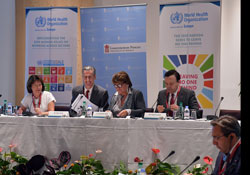Ministers endorse joint statement on climate change and health at high-level meeting of small countries

Government of Monaco
Today, health ministers and policy-makers from eight European countries endorsed a statement that commits them to joining efforts in protecting people’s health from adverse effects of climate change. The Third High-level Meeting of Small Countries, which includes WHO European countries with a population of less than one million, took place in Monaco on 11–12 October 2016 to strengthen collaboration in tackling today’s complex health challenges.
Main objectives set out in the statement include joint action on reducing greenhouse gas emissions and scaling-up cooperation on climate-related emergencies. The document stresses that health effects of climate change should be tackled through close collaboration between health ministries and other sectors. The determinants of today’s biggest public health challenges, such as climate change, lie largely outside the control of the health sector and measures to promote and protect people’s health and well-being cannot be confined to that sector alone.
“The health and well-being of people in small countries can be directly affected by the statement made in Monaco,” said Dr Zsuzsanna Jakab, WHO Regional Director for Europe. “This call for joint action shows the strong determination of health decision-makers to reduce death and disease from the impacts of climate change in their countries. We commend the small countries initiative for taking a clear stand on this issue, and I am convinced this will be a good example for many other Member States to follow.”
Small countries well-positioned to reach SDGs by 2030
The objectives set out in the statement are fully aligned with the Sustainable Development Goals (SDGs), which played a prominent role in the meeting agenda. Participants devoted two days to considering the best ways small countries can contribute to promoting sustainable development and health.
“We count very much on the small countries initiative in moving towards the achievement of the SDGs,” said Dr Jakab. “Small countries stand out for their agility and dynamic readiness to change and respond to problems – these are their inherent strengths compared to larger states. The initiative can help us understand how health sectors need to change and how they are already changing to reach the SDGs by 2030.”
New report launched and WHO collaborating centre announced
During the meeting, the WHO Regional Office for Europe launched a new report, titled Intersectoral action for health – Experiences from small countries, to which all members of the small countries initiative contributed. The publication reveals how different countries are making organizational changes and involving various sectors to reduce disease and improve health.
Additionally, it was announced that the Centre Scientifique du Monaco has been designated as the WHO Collaborating Centre for Health and the Sustainable Development Goals. A solid base of research and evidence is needed to support action on the SDGs. As a world leader on research related to sustainable development and health, the Centre’s collaboration with WHO can help make important gains in building the evidence base on the subject of health and the SDGs.
The meeting in Monaco was organized by the WHO Regional Office for Europe and its Office for Investment for Health and Development, in collaboration with the Principality of Monaco, represented by the Ministry of Foreign Affairs and Cooperation, and the Ministry of Health and Social Affairs. Participating countries included Andorra, Cyprus, Iceland, Luxembourg, Malta, Monaco, Montenegro and San Marino.



